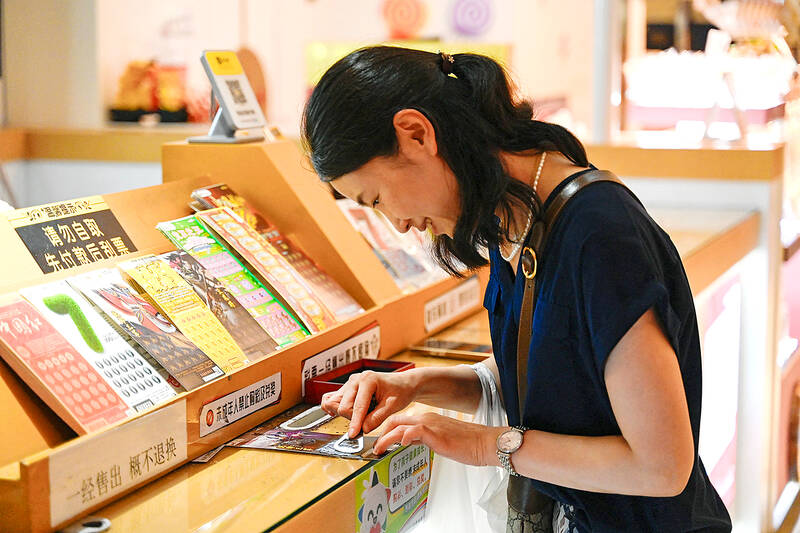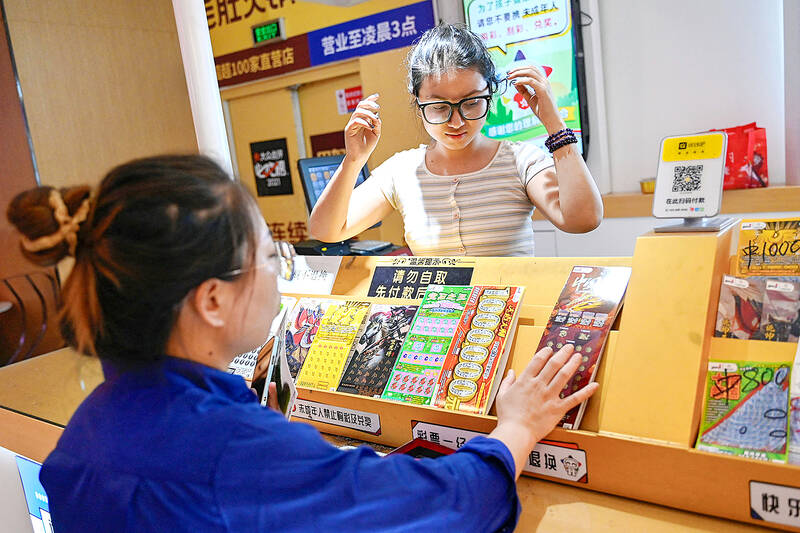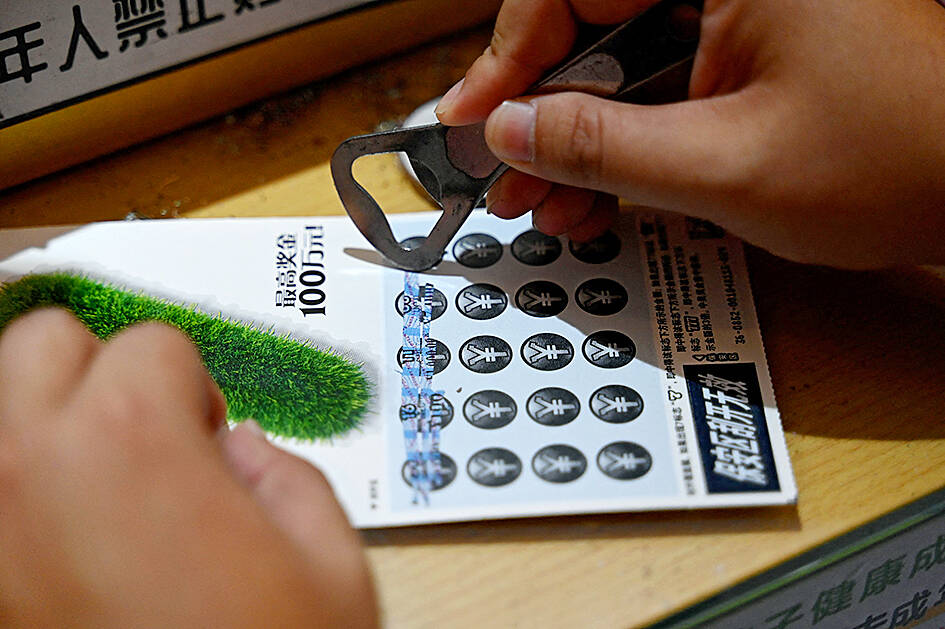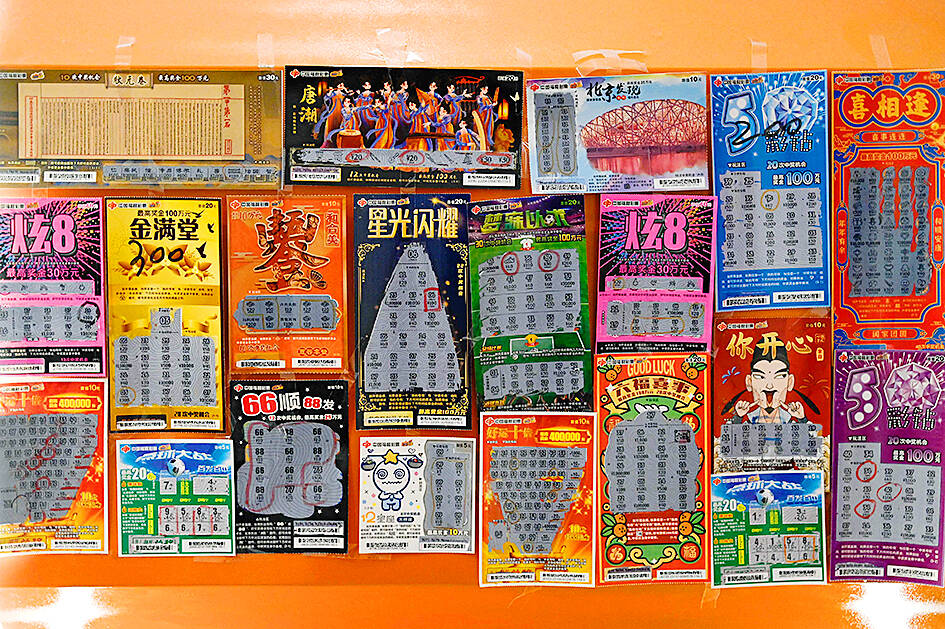Chinese livestreamer Chen Ying has spent more than 100,000 yuan (around US$14,000) on lottery scratch cards, which she systematically scrapes through on camera for her followers on social media platform Douyin.
But Chen, 28, is not playing to win in the traditional sense, despite China’s faltering economy offering little chance of a bonanza for young people.
Instead, she’s leveraging the increasing popularity of the lottery among young people in China to build up her follower count — a gamble that paid off when her fanbase went from a few hundred to more than 45,000 in the space of six months. Lottery sales in China soared to almost 274 billion yuan in the first half of the year, an increase of more than 50 percent year-on-year, with analysts pointing to a growing economic malaise as a possible explanation.

Photo: AFP
“I think it may be because it is not easy to make money now, especially when college graduates and unemployed people can’t find a suitable job, which makes them grasp onto the idea of getting rich suddenly,” said Chen, who is based in central Hunan province.
Months of disappointing economic data have confirmed China’s post-pandemic recovery is slowing, with the risk of prolonged deflation looming.
China announced on Tuesday it would suspend the release of youth unemployment figures, after previous sets of data hit record levels for several months in a row. Many of Chen’s followers are college students, and one-third are under the age of 23, according to their profiles.

Photo: AFP
“In people’s subconscious, the opportunity to get rich through labour is decreasing, so they are more willing to ‘take a chance’ through the lottery to see if they can get rich overnight through luck,” Huang Zhenxing, a professor at Shanghai University of Finance and Economics, told Chinese media Caijing recently. “It also means that people have little confidence in the current economy.”
On Douyin, Chen’s fans tune in for the vicarious thrill of seeing her tear through cards, leaving messages under the videos detailing their own luck.
“The possibility of... achieving overnight wealth is small,” Chen said matter-of-factly, something made clear to her audience by her repeated failures to win big. “Basically I’m trying to get popularity... and have more people get to know me and my brand.”

Photo: AFP
‘SENSE OF POSSIBILITY’
Chen is far from the only influencer to have jumped on the lottery bandwagon. Videos tagged with scratch card brand “Guaguale” — “scratch, scratch, happy” — have been viewed more than 6.7 billion times on Douyin, while there are 120 million views under the topic #Guaguale on Xiaohongshu. Curtis Cheng, 25, has found himself buying scratch cards more this year and has noticed he is not alone — at lunch and dinner time, the lottery stand near him is surrounded by young people.
“It’s a kind of small lucky feeling,” Cheng said. “It’s not a big deal if you don’t win, it’s just a way to spice up your life.”

Photo: AFP
But he said he thought there was also a deeper issue at play related to economic confidence.
“I think it’s probably because young people need a sense of possibility,” he said. “They need some luck to help them improve their current situation.”
Erika Cui, who works in the IT industry, said a scratch card provided a brief second of escape.
“The feeling of not having to think about my bad life because I’m so excited about the moment is much better than winning the lottery or not winning itself!” she said. “The economy hasn’t been very good over the years... the pressure of work and life is quite high, and everyone’s mental state is really worrying,” the 25-year-old said.
Cui linked the increasing popularity of the lottery to a burgeoning dropout culture that pushes back against China’s often intense study and work pressure.
“I feel that it is more of a self-deprecating state of ‘life is like this, why don’t we play a scratch card for fun, what if I win the lottery?’”

In the March 9 edition of the Taipei Times a piece by Ninon Godefroy ran with the headine “The quiet, gentle rhythm of Taiwan.” It started with the line “Taiwan is a small, humble place. There is no Eiffel Tower, no pyramids — no singular attraction that draws the world’s attention.” I laughed out loud at that. This was out of no disrespect for the author or the piece, which made some interesting analogies and good points about how both Din Tai Fung’s and Taiwan Semiconductor Manufacturing Co’s (TSMC, 台積電) meticulous attention to detail and quality are not quite up to

April 21 to April 27 Hsieh Er’s (謝娥) political fortunes were rising fast after she got out of jail and joined the Chinese Nationalist Party (KMT) in December 1945. Not only did she hold key positions in various committees, she was elected the only woman on the Taipei City Council and headed to Nanjing in 1946 as the sole Taiwanese female representative to the National Constituent Assembly. With the support of first lady Soong May-ling (宋美齡), she started the Taipei Women’s Association and Taiwan Provincial Women’s Association, where she

It is one of the more remarkable facts of Taiwan history that it was never occupied or claimed by any of the numerous kingdoms of southern China — Han or otherwise — that lay just across the water from it. None of their brilliant ministers ever discovered that Taiwan was a “core interest” of the state whose annexation was “inevitable.” As Paul Kua notes in an excellent monograph laying out how the Portuguese gave Taiwan the name “Formosa,” the first Europeans to express an interest in occupying Taiwan were the Spanish. Tonio Andrade in his seminal work, How Taiwan Became Chinese,

Mongolian influencer Anudari Daarya looks effortlessly glamorous and carefree in her social media posts — but the classically trained pianist’s road to acceptance as a transgender artist has been anything but easy. She is one of a growing number of Mongolian LGBTQ youth challenging stereotypes and fighting for acceptance through media representation in the socially conservative country. LGBTQ Mongolians often hide their identities from their employers and colleagues for fear of discrimination, with a survey by the non-profit LGBT Centre Mongolia showing that only 20 percent of people felt comfortable coming out at work. Daarya, 25, said she has faced discrimination since she